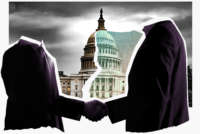
Republicans voted to block Democrats’ landmark voting rights bill, the For the People Act or S.1, on Tuesday. The bill that many have touted as a package that could save American democracy would have massively expanded access to voting and targeted corruption in politics.
Senate Republicans blocked debate on the bill in a party line, 50-50 vote. Due to the filibuster, the legislation needed 60 votes to advance to a debate. The House passed a version of the bill earlier this year.
Senate Majority Leader Chuck Schumer (D-New York) promised after the vote that he and his caucus would continue fighting for the legislation. “Republican senators may have prevented us from having a debate on voting rights today,” he said. “But I want to be very clear about one thing: the fight to protect voting rights is not over. By no means. In the fight for voting rights, this vote was the starting gun, not the finish line.”
Schumer added that the Democrats will “explore every last one of our options” to pass the legislation and combat voter suppression.
The obstruction of the bill has already reignited calls for the abolition of the filibuster; if the Senate could pass most bills with a simple majority vote, S.1 could have passed with Vice President Kamala Harris casting the tie-breaking vote. Democrats had even managed to get Sen. Joe Manchin (D-West Virginia), a holdout on the bill, to vote in favor of advancing its passage.
White House Press Secretary Jen Psaki has said that the blocking of the debate on the voting rights bill would “prompt a new conversation about the path forward” on the filibuster, though the White House has not given specific direction for Congress on the archaic practice.
Progressive legislators, meanwhile, have expressed frustration with the bill’s blocking and the continued existence of the filibuster, which they view as a significant roadblock to progress.
“It is a disgrace that at a time when authoritarianism, conspiracy theories and political violence are on the rise not a single Republican in the United States Senate has the courage to even debate whether we should protect American democracy or not,” tweeted Sen. Bernie Sanders (I-Vermont) on Tuesday night.
Here’s what Mitch McConnell just blocked. pic.twitter.com/KTLEodOB9A
— Elizabeth Warren (@ewarren) June 22, 2021
Lawmakers also pointed out the absurdity of the fact that Republicans can essentially implement minority rule with the filibuster. “Now is the time for majority rule in the Senate,” said Sanders. “We must end the filibuster, pass sweeping voting rights legislation, and protect our democracy.”
Rep. Alexandria Ocasio-Cortez (D-New York) echoed that frustration, saying “Call me radical, but I do not believe a minority of Senators should be able to block voting rights for millions of people. But I guess I’m just from that far-left school of thought that legislation should pass when a majority of legislators vote for it.”
Most of the progressive and Democratic ire around the filibuster has been directed at centrist Senators Manchin and Kyrsten Sinema (D-Arizona). Sinema wrote an op-ed earlier this week defending the filibuster, and Manchin has been found to be colluding with billionaire campaign donors recently to preserve the practice.
As a result, activist groups have been focusing their efforts on Sinema and Manchin in particular to convince them to flip on the filibuster — which so far seems unlikely. Still, the Poor People’s Campaign has organized several marches to pressure Manchin and Arizona racial justice and labor groups similarly protested outside Sinema’s office in Phoenix on Tuesday.
State legislators are also urging Congress to pass the voting rights legislation as they make desperate attempts to block the onslaught of voter suppression bills being pushed by their Republican colleagues. Nearly 500 state lawmakers signed a letter pleading for congressional leaders to pass S.1 and the John Lewis Voting Rights Act to stem the Republican voter suppression tide.
“We have attempted again and again to work with our Republican colleagues to set policies that safely and securely expanded voting access — but they simply refuse to act in good faith,” the lawmakers say. “We are out of options. We need your help.”
The blocking of the bill comes as Republicans are on a tear, proposing and passing a profusion of bills aimed at suppressing the vote in nearly every state. Even as Republicans in the Senate were blocking debate on S.1, for instance, Republicans in the Pennsylvania House passed a bill that would enact tighter voter ID laws and restrictions to absentee voting. It now moves to the state Senate, though the Democratic governor Tom Wolf has vowed to veto it.
However, other attempts by Republicans to suppress voting have been more successful. According to the Brennan Center for Justice, Republicans have so far enacted 22 voter suppression bills in 14 states less than six months into this year. They have filed at least 389 restrictive bills across 48 states as of May.
This post was originally published on Latest – Truthout.










